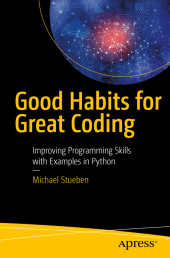 Neuerscheinungen 2018Stand: 2020-02-01 |
Schnellsuche
ISBN/Stichwort/Autor
|
Herderstraße 10
10625 Berlin
Tel.: 030 315 714 16
Fax 030 315 714 14
info@buchspektrum.de |

Michael Stueben
Good Habits for Great Coding
Improving Programming Skills with Examples in Python
1st ed. 2018. xxix, 314 S. 7 SW-Abb. 235 mm
Verlag/Jahr: SPRINGER, BERLIN; APRESS 2018
ISBN: 1-484-23458-8 (1484234588)
Neue ISBN: 978-1-484-23458-7 (9781484234587)
Preis und Lieferzeit: Bitte klicken
Improve your coding skills and learn how to write readable code. Rather than teach basic programming, this book presumes that readers understand the fundamentals, and offers time-honed best practices for style, design, documenting, testing, refactoring, and more.
Taking an informal, conversational tone, author Michael Stueben offers programming stories, anecdotes, observations, advice, tricks, examples, and challenges based on his 38 years experience writing code and teaching programming classes. Trying to teach style to beginners is notoriously difficult and can easily appear pedantic. Instead, this book offers solutions and many examples to back up his ideas.
Good Habits for Great Coding distills Stueben´s three decades of analyzing his own mistakes, analyzing student mistakes, searching for problems that teach lessons, and searching for simple examples to illustrate complex ideas. Having found that most learn by trying out challenging problems, and reflecting on them, each chapter includes quizzes and problems. The final chapter introduces dynamic programming to reduce complex problems to subcases, and illustrates many concepts discussed in the book.
Code samples are provided in Python and designed to be understandable by readers familiar with any modern programming language. At the end of this book, you will have acquired a lifetime of good coding advice, the lessons the author wishes he had learned when he was a novice.
What You´ll Learn
Create readable code through examples of good and bad style
Write difficult algorithms by comparing your code to the author´s code
Derive and code difficult algorithms using dynamic programming
Understand the psychology of the coding process
Who This Book Is For
Students or novice programmers who have taken a beginning programming course and understand coding basics. Teachers will appreciate the author´s road-tested ideas that they may apply to their own teaching.
Part 1: Not Learned in School
1. A Coding Fantasy
2. Coding Tricks
3. Style
4. More Coding Tricks
Part 2: Coding Advice
5. Function Design
6. Self-Documenting Code
7. Step-wise refinement.
8. Comments.
9. Stop Coding.
10. Testing
11. Defensive Programming
12. Refactoring
13. Write the Tests First (Sometimes)
14. Expert Advice
Part 3: Perspective
15. A Lesson in Design
16. Beware of OOP
17. The Evolution of a Function
18. Do Not Snub Inefficient Algorithms
Part 4: Walk the Walk
19. Problems Worth Solving
20. Problem Solving
21. Dynamic Programming
Michael Stueben started teaching Fortran at Fairfax High School in Virginia in 1977. Eventually the high school computer science curriculum changed from Fortran to BASIC, Pascal, C, C++, Java, and finally to Python. In the last five years, Stueben taught artificial intelligence at Thomas Jefferson High School for Science and Technology in Alexandria, VA. Along the way, he wrote a regular puzzle column for Discover Magazine, published articles in Mathematics Teacher and Mathematics Magazine, published a book on teaching high school mathematics: Twenty Years Before the Blackboard (Mathematical Association of America, 1998). In 2006 he received a Distinguished High School Mathematics Teaching / Edyth May Sliffe Award from the Mathematical Association of America.


